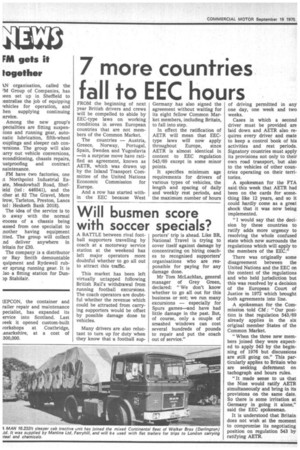7 more countries fall to EEC hours
Page 6

If you've noticed an error in this article please click here to report it so we can fix it.
FROM the beginning of next year British drivers and crews will be compelled to abide by EEC-type laws on working conditions in seven European countries that are not members of the Common Market.
The countries — Austria, Greece, Norway, Portugal, Spain, Sweden and Yugoslavia —in a surprise move have ratified an agreement, known as AETR, which was drawn up by the Inland Transport Committee of the United Nations Economic Commission for Europe.
And a row has started within the EEC because West Germany has also signed the agreement without waiting for its eight fellow Common Market members, including Britain, to fall into step.
In effect the ratification of AETR will mean that EECtype laws will now apply throughout Europe, since AETR is almost identical in content to EEC regulation 543/69 except in some minor points.
It specifies minimum age requirements for drivers of various types of vehicles, the length and spacing of daily and weekly rest periods, and the maximum number of hours of driving permitted in any one day, one week and two weeks.
Cases in which a second driver must be provided are laid down and AETR also requires every driver and mate to keep a control book of his activities and rest periods. Signatory countries must apply its provisions not only to their own road transport, but also to the vehicles of other countries operating on their territories.
A spokesman for the FTA said this week that AETR had been on the cards for something like 12 years, and so it could hardly come as a great shock that it was now being implemented.
"I would say that the decision by these countries to ratify adds more urgency to resolving the whole confused state which now surrounds the regulations which will apply to the members of the EEC."
There was originally some disagreement between the United Nations and the EEC on the content of the regulations and who held jurisdiction but this was resolved by a decision of the European Court of Justice in 1972 which brought both agreements into line.
A spokesman for the Commission told CM: "Our position is that regulation 543/69 already applies in the six original member States of the Common Market.
"When the three new members joined they were expected to apply 543 by the beginning of 1976 but discussions are still going on." This particularly applies to Britain who are seeking deferment on tachograph and hours rules.
" It made sense to us that the Nine would ratify AETR simultaneously and bring in its provisions on the same date. So there is some irritation at Germany in going it alone," said the EEC spokesman.
It is understood that Britain does not wish at the moment to compromise its negotiating position on regulation 543 by ratifying AETR.
















































































































